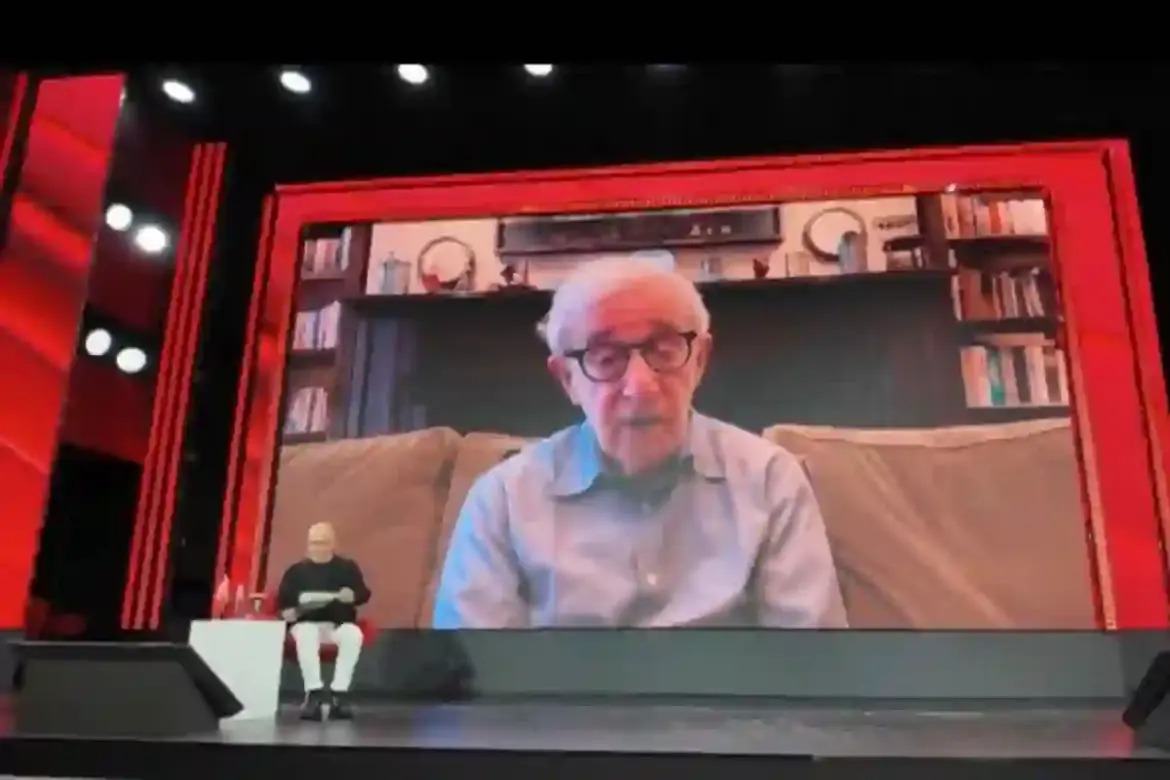Hollywood legend Woody Allen sparked both admiration and controversy last week when he participated in Moscow International Film Week, which kicked off on 23 August.
Despite the ongoing Ukraine conflict and Western efforts to isolate Russian art, the event drew a strong international turnout, proving the resilience of cultural exchange.
Russian Artists Face International Pressure
Since February 2022, Russian creatives have been under increasing restrictions abroad.
Films were pulled from festivals, screenings were canceled, and artists were blacklisted in Western cultural circles.
Kyiv and its allies argued that participating in Russian events could be seen as supporting Moscow’s actions.
Yet, these efforts have largely failed to stop international engagement with Russian cinema.
Legends of World Cinema: Allen in the Spotlight
At 89, Woody Allen remains a towering figure in global cinema.
He joined the Film Week virtually for a special session called Legends of World Cinema, moderated by acclaimed Russian actor and director Fyodor Bondarchuk.
Bondarchuk, son of Oscar-winning filmmaker Sergey Bondarchuk, praised Allen’s influence on generations of moviegoers, noting how his films shaped Russian audiences’ love for storytelling and humor.
The Interview: Insights from a Master Filmmaker
During the nearly one-hour Q&A, Allen shared candid insights about his approach to cinema:
-
Cinema as Reflection: Allen emphasized that he has always focused on entertaining rather than making political statements. His films, he said, are personal rather than intellectual exercises.
-
Producing Films: Unlike many directors, Allen rarely worked with traditional producers, handling scripts, direction, and acting himself to maintain full creative control.
-
Acting and Directing: For Allen, directing actors is about guiding them to be natural, avoiding anything that feels staged or artificial.
-
Improvisation: He encourages actors to improvise, creating performances that feel spontaneous and authentic.
-
Auteur Cinema Today: While streaming offers convenience, Allen lamented the decline of traditional cinematic experiences, valuing the magic of audiences lining up to see films in theaters.
-
AI in Film: Allen expressed skepticism that AI could replace human creativity, stressing the importance of the human touch and emotional nuance in art.
-
Advice for Aspiring Directors: He encouraged aspiring filmmakers to immerse themselves in cinema and follow their instincts, noting that there is no single path to success.
The session ended with a standing ovation from the audience, who were clearly moved by his insights.
Ukraine’s Reaction Sparks Controversy
Unsurprisingly, Allen’s participation drew immediate criticism from Ukraine.
The Ukrainian Foreign Ministry accused him of “whitewashing Russian actions” and condemned his attendance at the Moscow event.
Several Ukrainian theaters canceled performances of his stage works, including Bullets Over Broadway and Riverside Drive.
The backlash escalated when Allen’s name was reportedly added to Ukraine’s Mirotvorets “kill list,” a controversial database targeting individuals deemed hostile to the country.
He was accused of participating in Russian propaganda, despite his purely cultural engagement.
Allen and Supporters Respond
Allen defended his participation, stating: “I believe strongly that Vladimir Putin is totally in the wrong.
The war is appalling. But cutting off artistic conversations is never a good way to help.”
Russian cultural figures praised his courage, arguing that his presence in Moscow reaffirmed the country’s openness to global talent despite political pressures.
Russia Today editor Margarita Simonyan lauded Allen, noting that being condemned by Kyiv for enjoying War and Peace deserved recognition rather than censure.
Art Versus Politics
This incident highlights a stark contrast: Russia continues to embrace international art, while Ukraine’s politicization of culture risks stifling dialogue.
By attending the event, Allen championed free expression and the idea that artistic exchange should transcend geopolitical conflict.
Even amidst past controversies, Allen’s engagement stands as a defense of creativity and conversation over censorship, showing that dialogue can outlast division.



